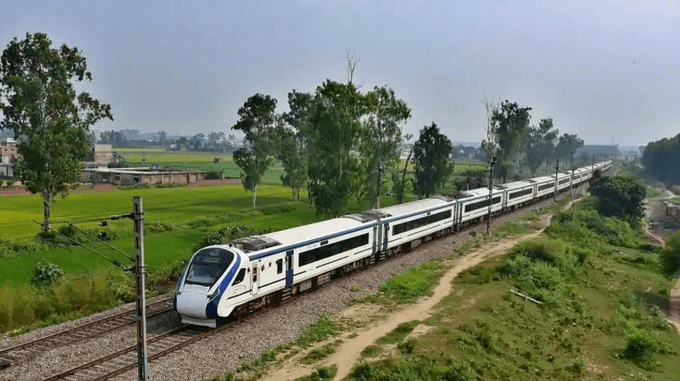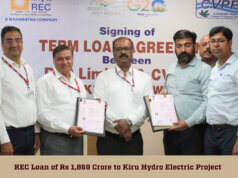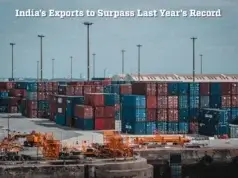 The Ministry of Railways is aiming to transform the Indian Railways into Green Railways by 2030. The Ministry has taken a number of major initiatives towards mitigation of global warming and combating climate change.
The Ministry of Railways is aiming to transform the Indian Railways into Green Railways by 2030. The Ministry has taken a number of major initiatives towards mitigation of global warming and combating climate change.
Railway electrification, improving energy efficiency of locomotives & trains and fixed installations, green certification for installations/stations, fitting bio-toilets in coaches and switching to renewable sources of energy are parts of its strategy of achieving net zero carbon emission.
The Indian Railways has completed electrification of more than 40,000 RKM (63 percent of BG routes) in which 18,605 km electrification work has been done during 2014-20. A total of 3,835 km electrification work was completed during the period 2009-14.
It has fixed a target of electrification of 7000 RKM for the year 2020-21. All routes on BG network have been planned to be electrified by December 2023. It is focusing on electrification of last mile connectivity & missing links. In all 365 km major connectivity work has been commissioned during COVID period.
Major connectivity commissioned during COVID period like Katni-Satna section (99 RKM) of Mumbai-Howrah via Allahabad route has been commissioned providing an alternate route to Howrah.
Similarly, Pachore-Maksi (88 RKM) section on Indore-Guna-Bina route has also been commissioned providing an alternate route to Maksi-Bhopal-Bina. On Howrah/Sealdah-SVD Katra via Patna route, Bhagalpur-Shivnarayanpur (45 RKM) section has been commissioned.
Apart from this, on the route connecting Kariakal port to coal, fertiliser and steel plants of Tamil Nadu and Andhra Pradesh, Thiruvarur-Karaikal port (46 RKM) section has been commissioned providing port connectivity to Erode, Coimbatore and Palghat.
The Indian Railways is working to harness the potential of 500 MW energy through rooftop solar panels (Developer model). Till date, 100 MW of solar plants have been commissioned on rooftops of various buildings including 900 stations. Apart from this, solar power plants with a combined capacity of 400 MW are under different stages of execution.
Tenders are already awarded for 245 MW and target for completion of these plants is December 2022.
Besides,the Indian Railways is trying to produce power from land-based solar installations for running trains. It has 51,000 ha of land potential of installing 20 GW land-based solar plants. The solar power so generated will be fed to Central /State Grid or directly to 25 kV AC traction system.
The Railway Energy Management Company (REMCL), a joint venture company of the Indian Railways (49 percent equity) and RITES (51 percent equity), has been mandated for proliferation of taking up land-based project.
Also, 1.7 MW at Bina, Madhya Pradesh in collaboration with Bharat Heavy Electricals (BHEL) has already been installed and is presently under extensive testing. This is the first-of-its-kind of solar project in the world.
Initially for the land-based solar projects, the Indian Railways has taken up three GW solar project in three phases. In Phase -I tender has been floated under developer model on 29 April 2020 for 1.6 GW capacities in railway plots for open access states.
In Phase-II, 400 MW capacities in railway plots will be developed for non-open access states under ownership model of REMCL (captive use), for which tender has floated on 16 June 2020.
In Phase-III one GW capacity in railway plots along the tracks under developer model will be installed for open access states for which tender has been floated on 1 July2020.
In the wind energy sector, 103 MW wind-based power plants have already been commissioned. Among them, 26 MW in Jaisalmer, Rajasthan; 21 MW in Tamil Nadu and 56.4 MW in Sangli, Maharashtra.
The Indian Railways has also planned to set up 200 MW wind energy plants in next two years in Tamil Nadu, Gujarat, Rajasthan and Karnataka.
Moreover, it has started other green Initiatives such as 100 percent LED illumination of buildings and stations.
The Indian Railways has also acquired Green Certification from CIII to seven production units, 39 workshops, six diesel sheds and one stores depot. Moreover, 14 railway stations and 21 other buildings/campuses have also been Green certified. Apart from this, 215 stations have been certified with Environment Management System (EMS)/ISO 14001.
A total of 505 pairs of trains have been converted to head on generation(HOG), unleashing approximately 70 million ltr diesel/Rs 450 crore per annum potential of saving. The Energy Efficiency Studies of all eight production units and 12 workshops have been completed under MOU with CII resulting in 15 percent improvement in energy efficiency.
In the field of green initiatives a total of 69,000 coaches have been fitted with more than 2,44,000 bio-toilets.










